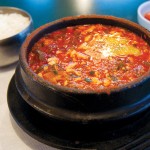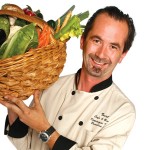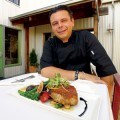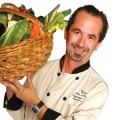A few weeks ago, I interviewed a chef in Milwaukee and asked him why he buys from so many local purveyors and farms. Why was it important to him? His response was simple, but I thought, profound: If we want the community to support us we need to support the community. Well,
of course. That’s just so logical.
At their best, restaurants are more than places to satisfy an appetite, they are a reflection of the community. They are gathering places, an extension of our kitchens and living rooms. While we have little control over what’s happening in Washington and Sacramento, we have complete control over what we eat and where. Voting with your food dollars is a powerful statement of our values. You can eat at McDonald’s, a corporation that sells low-cost food (at least on the front end; we all pay the price for “cheap” food later) and has little stake in the community it purports to serve. Or you can eat at a locally owned restaurant that succeeds or fails based on the quality of its food and its connection to the community. I choose the latter.
On one level, the second annual Silicon Valley Restaurant Week, which runs Nov. 3–10, is simply a good business proposition. By lowering prices and offering attractive three-course meals, restaurants are able to attract large numbers of customers over one week and maybe pick up some repeat business. For diners, spending $25–$45 for a prix fixe meal gets them a good taste of a restaurant they might not otherwise be able to afford. But it’s my hope that restaurant owners and diners alike derive something more: community.
As I wrote in the introduction to the chef profiles elsewhere in this issue, Silicon Valley’s restaurant scene is heating up. Four local restaurants just picked up their first Michelin stars while the region’s ethnic restaurants continue to shine, albeit a bit out of the limelight. The quality of the food is moving the dining scene forward, but restaurants that cultivate a sense of community with local wine lists and products, benefit dinners and civic-minded giving are helping grow the region’s restaurant industry as well.
It’s my hope that restaurateurs take the long view and participate in the restaurant week not only to make some money but also to cultivate their place in the community and look beyond boosting sales in the short term. Restaurant week is a chance for local eateries to step out and show not only their best cooking but also their desire to offer that intangible but all too rare sense of community. I also hope that diners enjoy a good meal and night out as well as realize that by supporting local restaurants, especially during these difficult times, they are putting dollars back into their community and voting with their forks to create the kind of reciprocal relationships that make communities so vibrant and vital.
 Review: On Koreatown’s Soontofu Trail
Review: On Koreatown’s Soontofu Trail  Profile: Chef Dominique Faury
Profile: Chef Dominique Faury 


